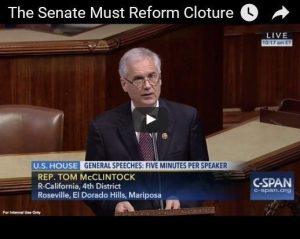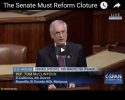Mother Lode Congressman Tom McClintock remarked on what he calls a “clear mandate given by the American people” for change while blasting some in the Democratic Party for making vicious pledges to thwart this mandate through cloture.
McClintock was Thursday’s KVML “Newsmaker of the Day”.
The United States Senate Reference Glossary defines cloture as the only procedure by which the Senate can vote to place a time limit on consideration of a bill or other matter, and thereby overcome a filibuster. Under the cloture rule (Rule XXII), the Senate may limit consideration of a pending matter to 30 additional hours, but only by vote of three-fifths of the full Senate, normally 60 votes. McClintock delivered his speech on the House Floor Wednesday taking aim at the Senate’s use of cloture stating “The greatest single obstacle to this era of reform is the 60-vote threshold to invoke cloture in the Senate, and I rise today to urge the Senate to finally reform it. Given the record of abuse of this rule and the avowed intentions of many in that body, nothing will change legislatively unless the Senate Republican majority takes action when they organize in January. All the reforms that the American people called for and that the President will request and the House will pass will be stopped dead in the Senate. “
Critics argue that McClintock assertion of a “clear mandate” from voters is a stretch as former Secretary of State and Democratic challenger Hillary Clinton won the popular vote by more than a million and counting.
Here is Congressman McClintock’s entire speech:
“Mr. Speaker:
The American people have given our 45th President and the 115th Congress a clear mandate to revive our economy, secure our borders, restore our nation’s sovereignty, reinstate our Bill of Rights, and uphold the Rule of Law. Moreover, they have given us majorities in both houses of Congress to do so. There is no excuse for failure.
President Obama and Secretary Clinton set a positive tone for the peaceful transition of power, a tone no doubt shared by many members of Congress and many Americans of good will who did not vote on the prevailing side. This represents the best of American statesmanship.
Yet we have also heard reactionary elements of the Democratic Party make a vicious pledge to thwart this mandate and destroy this president. One need look no further than Senator Reid’s disgraceful diatribe on Friday to realize that these threats far exceed the lunatic fringe now violently rioting in our streets. They reach directly into the halls of Congress.
To fulfill the mandate of the American people, we will need to deliberate wisely and in good faith, with all sides participating in the discussion and all voices heard. But ultimately, those deliberations must result in laws to fulfill that mandate. The agenda is daunting and time is fleeting.
The greatest single obstacle to this era of reform is the 60-vote threshold to invoke cloture in the Senate, and I rise today to urge the Senate to finally reform it. Given the record of abuse of this rule and the avowed intentions of many in that body, nothing will change legislatively unless the Senate Republican majority takes action when they organize in January. All the reforms that the American people called for and that the President will request and the House will pass will be stopped dead in the Senate.
I do not argue to abandon this rule, but rather to restore it to its original purpose. Cloture is rooted in a sound and ancient parliamentary principle: that as long as one third of a deliberative body wants to debate an issue, that debate should continue. After all, a minority exists to convince the majority to its way of thinking; this is the essence of deliberation.
But this principle assumes it is an actual debate where members are talking to one another – and it requires that the debate be germane to the question at hand and that it is not dilatory. That is how cloture started – but over the 20th Century it degenerated into a 60-vote administrative threshold just to consider legislation. Ironically, a procedure designed to PROTECT debate has now morphed into a procedure that very effectively PREVENTS debate.
The two houses of Congress are designed to disagree with each other. Once the House and the Senate independently exercise their best judgment on a particular matter, there is a conference process developed over centuries to resolve their differences. But this process cannot function if one house simply refuses to consider the other house’s work.
The modern notion of cloture prevents that process, and the system breaks down. During the last several congresses, the House sent hundreds of bills – including the appropriations bills that fund this government – to the Senate. But instead of amending their ideas into those bills – or sending us bills of their own – they have simply refused to consider them by a minority denying cloture.
Some Senators have said that this mechanism is necessary to preserve collegiality and encourage compromise. How can you have collegiality when one side simply refuses to talk to the other? How can you have compromise when the matter to be compromised cannot be taken up and discussed?
Others have said that since most legislation grows the powers of government, this is an effective brake on that tendency. It’s true this rule effectively blocks bad legislation. It also very effectively blocks good legislation that is necessary to reverse this trend. The current cloture rule provides a ratcheting effect that locks in every expansion of government over the past century.
Some Republicans have said it has been most useful when they’ve been in the minority. I ask them: do you want to be a successful MAJORITY or a successful MINORITY? You cannot be both as long as cloture exists in its current form.
Voters elected Republican majorities in both houses of Congress and they expect action. They’ll get it from the President and from the House. But in order for the Senate to rise to this occasion, it must reform its cloture rule when it organizes in January.
The “Newsmaker of the Day” is heard every weekday morning at 6:45, 7:45 and 8:45 on AM 1450 and FM 102.7 KVML.


